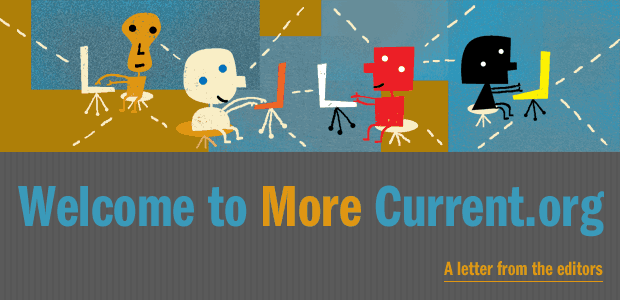A letter from the editors

We’ve been preparing for months to bring you a new, improved web service, one that highlights more of our news coverage and analysis of the evolving world of public media.
The new Current.org, which launched on Aug. 1, is designed to give readers more tools for keeping current with the public media news that fits their needs and interests. You can graze through our blog, which has been renamed “Quick Takes,” or our curated list of tweets from people in public media. For long reads, browse through the carousels for in-depth coverage of the various disciplines of public media — from content production to development, system policy, and technology. Or customize your reading experience from the home page, using the drop-down menu that organizes stories by subject category.
We’re especially pleased to unveil a website with comment features and social media hooks that allow readers to interact with each other — and us — about the news and issues reshaping the field of public media.
Most stories published since 2010 and thousands of blog posts dating back to 2002 have been ingested into our WordPress content management system, and others from our old site remain accessible in their old formats.
If you read our blog through an RSS feed, you can now choose among additional customized feeds — or you can subscribe to a feed that gives you links to everything we post to the site.
We hope you find this new online service complements the in-depth reporting that readers expect from our biweekly print edition. We’re intensely interested in your reactions and suggestions for new information services and features. Please send them to web@current.org.
For this upgrade we thank the Wyncote Foundation of Philadelphia, a committed supporter of public media, which generously provided a grant to cover web development costs.
We’ve revived another ongoing service: Opportunities, a web column alerting you to solicitations for grant proposals and announcements of training seminars and competition deadlines.
For job seekers and employers, the site still offers a jobs board that is the most timely and comprehensive in public media. We’re planning a major upgrade to this service later this fall in partnership with the Public Media Business Association: a new online Career Center that provides new tools for job seekers and recruiters, including a truly anonymous and fully searchable resume bank, an applicant screening tool, and a system for accepting online applications.
For advertisers, who pay most of the bills for this publication about noncommercial media (an ironic situation, we know), Current.org provides a faster, more flexible means of reaching additional people in the field, supplementing our print edition, each platform with its own fans.
As a relatively new ward of the American University School of Communication, we remain a nonprofit dependent largely on ad and subscription sales to help you keep current.
Like many media, Current has more readers than in the past, thanks to the Web, but fewer to help cover the costs by subscribing. We hope you’ll consider the value of the service we provide in future marketing appeals.
On the tech side, the site itself is a product of public media, as it has been concocted from WordPress, an open-source content management system continually updated by hundreds of coders and publishers around the world. Thanks also to them, to our web developer, AardvarkBrigade.com of New Brunswick, N.J., and to our advisors, CarpeDigitem.com.
Welcome to the new Current.org. Visit frequently, share the site with colleagues and join us in building on this new start.
Karen Everhart
Interim Managing Editor
Steve Behrens
Projects Editor








Beautiful site. What an improvement from before!
Love it, gang.
Congratulations. From a good site to a great one. Keep up the good work.
Beautiful redesign. Keep up the good work!
Great work!
Have you considered adding geotagging so we can subscribe to content – news, opportunities, and jobs – in our own parts of the country?
Thanks so much for moving this important communications vehicle toward a digital first model, just as PBS and NPR are doing …